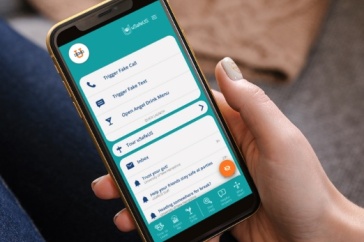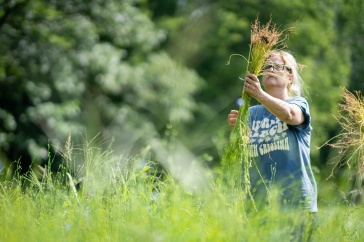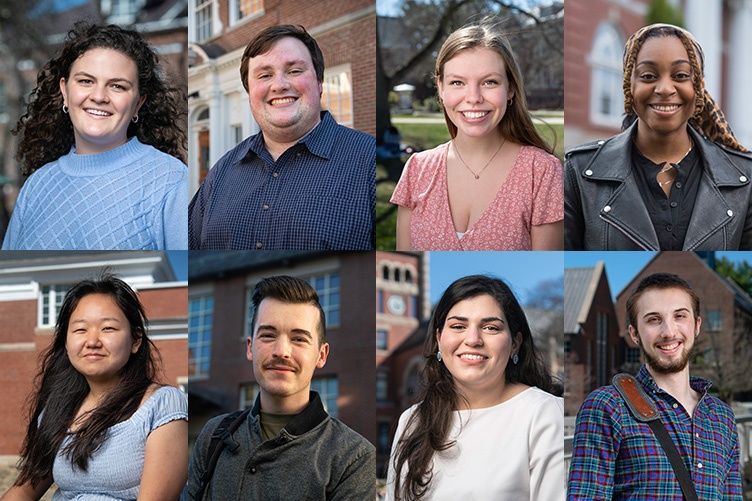
Meet the College of Liberal Arts student fellows. Each year, the college selects a small number of outstanding seniors to represent the college during their final year of study. Get ready to be wowed by these go-getters who have pursued internships and study around the state, country and world, all while building strong communities on campus. As they move on to new adventures, we’re pretty sure they’re leaving UNH just a little better than they found it.
Laura Clancy Makenna Comeau Taryn Duncan Sarah Jarrar Abrita Kuthumi Brendan McWalter Peter Murray Gordon Unzen
Laura Clancy

Laura Clancy wasn’t sure she wanted to attend UNH. The daughter and sister of former Wildcats, the Rhode Island native initially wanted to attend a larger school, perhaps farther away. But now, looking back on her UNH experience, she knows it was the right choice. “UNH has everything I wanted: research, study abroad and internship opportunities, and diverse classes,” she says. “I’m so happy this is my school!”
A double major in sociology and justice studies with a minor in Middle Eastern studies, Clancy has explored many areas of interest during college. The winner of a UNH foreign language award for Arabic, she put her English and Arabic skills to good use during the Washington Center internship program as an intern at the Enabling Peace in Iraq Center, a non-profit organization. Clancy researched and wrote weekly reports on political, humanitarian and economic events in Iraq. During spring 2020, she studied in Budapest, Hungary, through the Justice Studies Program. “Everyone says you gain independence and a more worldly view by traveling abroad. Traveling during the pandemic only added to that belief (for me),” she says.
This year, Clancy is completing her honors thesis on nationalism and patriotism in college students and the impact of this ideology on their views of Middle Eastern foreign affairs. The project brought her together with her favorite teacher (and advisor) Catherine Moran, principal lecturer in sociology. Moran helped Clancy shape her year-long independent research study on the existence and trends of coastal elitism, which Clancy presented at the UNH Undergraduate Research Conference in 2019.
One of Clancy’s favorite college experiences (aside from cooking) is being a campus tour guide. “It’s an amazing way to meet new people from all over the country, practice public speaking and connect with other UNH students of all majors and years,” she says. She now works with Admissions as part of the program’s student advisory board.
Clancy is applying for fellowships after graduation and hopes to return to Washington, D.C., to work in policy analysis, international affairs or social research. “I think my experiences at COLA and practicing independence and self-advocacy will serve me well after graduation,” she says.
“I don’t think there’s any other college where I could dual major, minor, study away, study abroad and still graduate in four years. It’s an incredibly welcoming and supportive community.”
Makenna Comeau

Although she entered UNH undeclared, Makenna Comeau trusted that COLA had many options for someone with diverse interests in anthropology, psychology and the humanities. “It was important for me to test the waters before settling into a major because I wanted to make the very best decision for my future,” she says. “I most appreciated my Introduction to Media Studies class with Joseph Terry. I was fascinated with mass media and broadcasting in high school but didn’t realize there was a major that fit my passions so perfectly.”
One reason the communication major came to UNH was its proximity to her hometown of Merrimac, Mass. But lessons about independence came early, when she lived in a triple dorm room freshman year. “It taught me so much about becoming independent and adapting to change,” she says. “We would fight over silly things like Domino’s Pizza vs. Durham House of Pizza or who took out the trash, but, because I embraced the roommate situation, they ended up becoming my best friends.”
She’s embraced other new opportunities, too, from attending dorm socials freshman year to participating in a range of co-ed intramural sports including soccer, floor hockey and broomball. “It sounds like a cliché but this strategy allowed me to find my own community that’s stayed with me,” Comeau says.
Experiential learning is another area where Comeau found success. During her sophomore year, she interned at New Hampshire Public Broadcasting. From developing copy for social media, press releases and on-air promotions to learning basic video editing techniques, she engaged in an exciting multi-media landscape. Although her study abroad experience in Florence, Italy, was cut short by the pandemic, she remembers it as “the experience of a lifetime. My time abroad pushed me completely out of my comfort zone,” she says. “It was the best decision I could have made.”
Comeau has found a path, despite initially being unsure of her major. She plans to pursue a career in marketing and public relations. “The authenticity of COLA’s staff and faculty, along with the appreciation they have for students, sets COLA apart,” she says. “They want you to succeed.”
Taryn Duncan
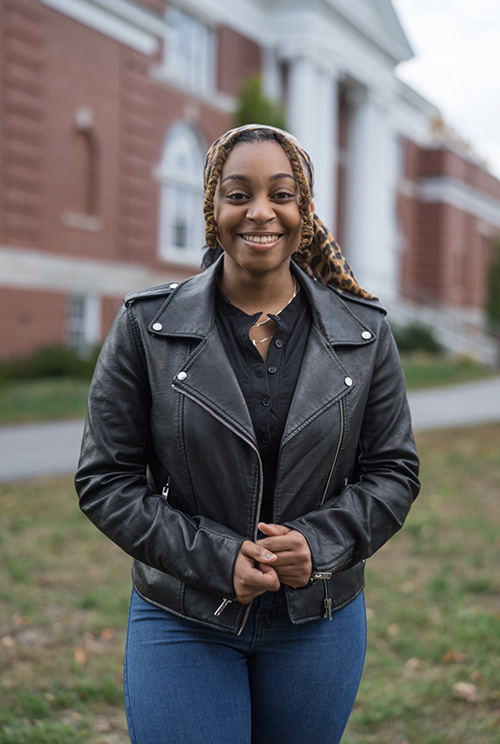
Whether it’s participating in a campus-wide discussion on equity, justice and freedom or working at the Beauregard Center, Taryn Duncan draws energy from connection. It has, however, required her to step out of her comfort zone. “I’m shy, but I still enjoy meeting new people,” she says.
The Windsor, Conn. native’s favorite part of being a Wildcat has been the organizations she’s joined. In addition to working at the Beauregard Center, she’s a member of Black Student Union, NALA (the support group for women of color at UNH), QT (a support group for queer and trans people of color) and a Treat Fellow Facilitator. “I’ve made really close friendships through these clubs and organizations,” Duncan says. “They’ve been a big reason why I’ve enjoyed my time here.”
Although she came to UNH as a music education major, Duncan switched her major to women’s and gender studies with minors in criminal justice and anthropology. A motivating factor for the switch: lecturer Joelle Ryan, who taught many of the classes that inspired Duncan. “My favorite classes were Race Matters, Sex Workers Rights and Trans/Forming Gender,” she says. “They were the most interesting and diverse classes. I learned so many new things.”
The winner of a Women’s and Gender Studies award, the Kidder Fund Award and a Judge William W. Treat Fellowship, Duncan interned the summer prior to her sophomore year at Koya Leadership Partners, an executive search and consulting firm in Newburyport, Mass. “I learned real-world skills and organizational habits,” she says. “I enjoyed working and creating content for the company.”
After graduation, Duncan hopes to continue her diversity work by working in a diversity outreach program or in human resources. Her biggest takeaway as a COLA student: “I love the courses in this college. COLA has pushed each and every student to the max. The school’s mission is to prepare and support their students. I’ve felt that push and drive since day one.”
Sarah Jarrar

Originally from the small town of Homewood, Ala., Sarah Jarrar found a home at UNH as a sophomore transfer student in 2018. “I immediately felt welcomed by the faculty,” she says, “and was eager to learn more about what UNH had to offer.”
A commuter student from Bow, NH, Jarrar has maximized her time as a Wildcat. A double major in anthropology and history, she’s especially interested in the Middle East. As a sophomore, advised by anthropology senior lecturer Sara Withers, Jarrar researched publicly accessible data about migrant populations and came up with an innovative idea. Her proposed Janas Analytics software to predict global migrant crises won third place at the NH Social Venture Innovation Challenge in 2018.
During her junior year, she presented a history colloquium project at the UNH Undergraduate Research Conference about foreign contributions to the cultural sector of the occupied Palestinian territory of the West Bank. “I loved the research process and working with my professor, Ethel Wolper, to develop my paper into an engaging presentation,” she says. Another research project, an oral history of the Palestinian experience in Kuwait between 1948 and the Gulf War, was published in the Macksey Journal, an undergraduate academic publication of Johns Hopkins University.
One of Jarrar’s most transformative experiences was an internship with the U.S. Department of State. As a public diplomacy intern at the U.S. Consulate General in Dubai, she spoke with young Emiratis about their educational interests and about higher education opportunities in the United States. “I also developed outreach programming catered to Emiratis in the UAE,” Jarrar says. “I learned a lot about the realities of diplomacy and the volatility of U.S. foreign policy in action.” She also won a COLA study abroad award to study archeological surveying and mapping methods in Belize.
Jarrar is a semifinalist for a Fulbright research grant to conduct research with Syrian migrants in Istanbul. She’s also applied to social data science graduate programs and wants to pursue a doctorate in anthropology.
“In one way or another, all of my COLA professors have taught me that intellectual autonomy and the ability to make an effective argument are important skills,” Jarrar says. “As a liberal arts major, I have a strong ability to approach and process information in a critical way.”
Abrita Kuthumi

When she first arrived at UNH, Abrita Kuthumi thought she would study medicine. But, after studying abroad and a Washington, D.C., internship, she switched her major to political science and international affairs with a minor in English. It dovetails well with her desire to help others.
Kuthumi, who moved to New Hampshire from Nepal as a child, lived in the Fairchild international dorm freshman year. “I became friends with a lot of the South Korean residents and that led me to study Korean,” she says. She traveled to Korea twice on Critical Language Scholarships, teaching children in Gwangju about Nepal and the U.S., taking Korean language classes and staying at Beomeosa Temple in Busan. Languages are among Kuthumi’s strengths — she speaks fluent English and Nepali and has some knowledge of Hindi and Korean.
Kuthumi put her international knowledge to work while interning for the New Hampshire World Affairs Council, researching and writing about news topics such as the impact of COVID-19 on developing nations, anti-racist movements in Indonesia, boundary disputes between Nepal and India and more. A 2020 Truman scholar and recipient of a TRIO scholarship, the Helen Duncan Jones Award and an Undergraduate Research Conference Award of Excellence, Kuthumi interned for the U.S. Department of State through the Washington Center. An invaluable learning experience, she researched international education news, analyzing data and meeting with students online to discuss higher education in the U.S. “I learned a lot about professional writing, public speaking and data tracking,” she says.
Kuthumi has applied for several fellowships after graduation: she’s a semi-finalist for the Fulbright English Teaching Assistant program in India and a Henry Luce Foundation scholarship. No matter what her career choice, she believes her liberal arts education leaves her prepared. “COLA has helped develop my ability to think critically, write and communicate,” she says. “The skills I’ve gained are invaluable.”
Brendan McWalter

Brendan McWalter has enjoyed music since he was a child in Franklin, Mass.: music was his favorite class in elementary school, and he started playing saxophone when he was in 6th grade. “Music was a stress reliever for me,” he says. During high school, as a counselor at a summer music camp, he helped draw out shy campers with musical improvisations. “Working with those students gave me so much joy that teaching music just made sense,” he says.
UNH was a natural destination for this music education major because “every music teacher I had went to UNH,” McWalter says. In addition to saxophone, he’s explored singing, guitar, piano and a range of woodwind, brass, string and percussion instruments, all during his courses of study at COLA. His favorite music to play is wind literature (music written for concert bands). “All music has emotion and a message, but I find that wind literature is the best way to tell a story to an audience,” he says.
Performances with other collegiate musicians have been a highlight. “I’ve had lots of amazing performance and collaborative opportunities, including high school outreach tours and participating in chamber concerts and competitions,” McWalter says. He gained valuable leadership experience as president of UNH’s chapter of the National Association for Music Education as well as running rehearsals and performing with groups such as the UNH Wind Symphony, Symphonic Band, Wildcat Marching Band, and jazz bands and saxophone quartets. Through a Crew Fellowship, McWalter recorded and live streamed concerts and recitals put on by the UNH Music Department. “It’s given me experience using all different types of recording equipment that will definitely help me when I’m a teacher,” he says. McWalter hopes to secure a music teaching position after graduation and eventually become a band director.
Perhaps the most valuable lesson McWalter has learned at UNH comes from associate professor of music Nathan Jorgensen: to be in the moment. “If you’re thinking about something that happened in the past, you aren’t thinking about what’s happening in the present and the immediate future, which are the most important things to think about when you’re on stage,” McWalter says. “I apply that advice to everything outside of music, as well.”
Peter Murray

When he stepped onto campus as a freshman, Peter Murray knew he wanted to study history. By the time he was a senior, he had added photography and a new appreciation for the visual arts to his varied interests, which include competitive powerlifting and working for the New Hampshire Air National Guard.
Murray, who hails from Rochester, N.H., was intrigued by UNH’s study abroad programs. “One of the reasons I chose UNH was its convenience, but I also wanted to study abroad and knew their resources were varied,” he says. Studying at Regents University in London was transformative. “I studied British museums and wrote a short book, ‘The Art of Outcasts,’ about artists fleeing persecution in World War II,” he says. “Study abroad allowed me to experience a new way of life and education and I became a better researcher and storyteller.”
Studying abroad also enabled Murray to explore his passion for photography. “When I was abroad, I set a goal to take 100 pictures a day, edit ten, then post one (on social media),” he says. An especially meaningful project was a three-section photography series examining internal strife and past regret, entitled Ceasefire, Wasteland and Eternal Night. “I learned what I like and don’t like and how to quickly convey a story through a picture,” he says. He was later able to conduct independent research by working in UNH’s photography lab.
As a history major, Murray specialized in British history; his junior year, he won the Marston Scholarship for his research about the 1918 Korean Declaration of Independence and presented at the Undergraduate Research Conference.
After taking a museum studies course with history lecturer Kimberly Alexander, Murray interned at the Portsmouth Athenaeum and the American Independence Museum in Exeter, NH. Both internships enabled him to explore research methods, exhibition curation and communications. Now, Murray is considering a variety of career options after graduation: working with the Air National Guard; developing online history courses for museums; or delving further into his photography work. Lessons learned from his powerlifting experience also reflect his time at UNH. “The greatest parallel I can think of is my belief in delayed gratification and being willing to endure temporary discomfort while working towards a long-term benefit,” he says.
Gordon Unzen
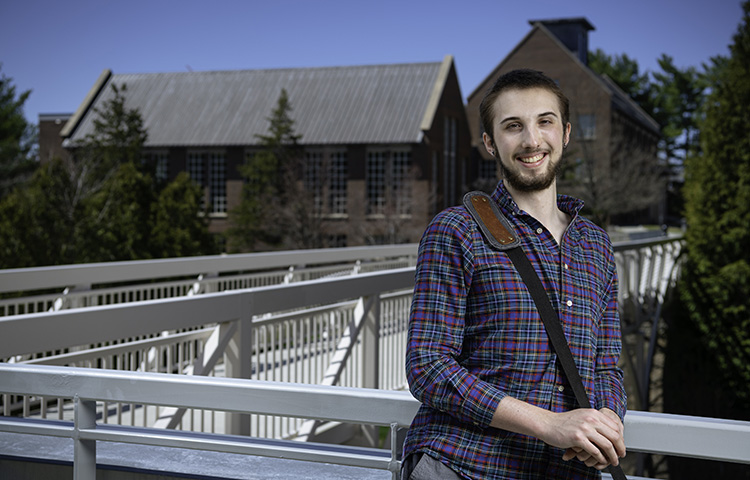
A triple major in psychology, philosophy and justice studies with a minor in German, Gordon Unzen is busy. Interestingly, the most important lessons he’s learned at UNH are about simplicity: connecting with friends and peers, taking walks outdoors or being in nature. “I’m usually on the go, so slowing down and stepping outside the noise has been valuable,” he says. “I’ll always strive to push myself but I’ve learned how to take care of myself so I can be present in the commitments that are most important to me.”
Unzen has definitely pushed himself. He’s co-president of UNH’s chapter of Psi Chi (the National Honor Society in psychology) and a member of Phi Beta Kappa. His academic awards include one for excellence in the study of German — he taught himself the language as a high school student, then studied abroad freshman year to master it — as well as an award for a UNH Undergraduate Research Conference philosophy presentation his junior year. The recipient of a Hamel Scholarship, Unzen also received a Summer Undergraduate Research Fellowship (SURF) junior year to research the impacts of artificial intelligence in the field of criminal law, the career he hopes to pursue after graduation. In addition to sitting on the UNH Student Senate his first year and participating in campus political organizations since then, he’s currently co-coordinator of the Socratic Society and a resident assistant in Gibbs Hall.
Interested in a criminal justice career, Unzen interned with the city attorney’s office in Rochester, N.H., and in UNH professor Ellen Cohn’s Legal Socialization Lab. “The Rochester law internship was super interesting because I worked hands-on with lawyers and actors in the system and it solidified my drive to go into criminal law,” Unzen says. “The research internship gave me a chance to assist in leading the lab and conduct independent research projects which have prepared to me to undertake an honors thesis in psychology.”
As he weighs law school admissions, Unzen believes COLA has prepared him for whatever the future brings. “I loved my experience in COLA,” he says. “It allows students to undertake multiple majors, do independent research, study abroad, and really connect with faculty. I feel prepared to go to law school with a wide variety of viewpoints and academic lenses under my belt.”
-
Written By:
Debbie Kane | Freelance Writer
















































